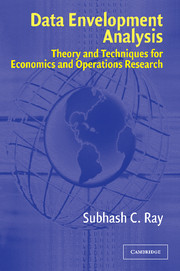Book contents
- Frontmatter
- Contents
- Preface
- 1 Introduction and Overview
- 2 Productivity Efficiency, and Data Envelopment Analysis
- 3 Variable Returns to Scale: Separating Technical and Scale Efficiencies
- 4 Extensions to the Basic DEA Models
- 5 Nonradial Models and Pareto–Koopmans Measures of Technical Efficiency
- 6 Efficiency Measurement without Convexity Assumption: Free Disposal Hull Analysis
- 7 Dealing with Slacks: Assurance Region/Cone Ratio Analysis, Weak Disposability, and Congestion
- 8 Efficiency of Merger and Breakup of Firms
- 9 Efficiency Analysis with Market Prices
- 10 Nonparametric Approaches in Production Economics
- 11 Measuring Total Productivity Change over Time
- 12 Stochastic Approaches to Data Envelopment Analysis
- 13 Looking Ahead
- References
- Index
10 - Nonparametric Approaches in Production Economics
Published online by Cambridge University Press: 24 November 2009
- Frontmatter
- Contents
- Preface
- 1 Introduction and Overview
- 2 Productivity Efficiency, and Data Envelopment Analysis
- 3 Variable Returns to Scale: Separating Technical and Scale Efficiencies
- 4 Extensions to the Basic DEA Models
- 5 Nonradial Models and Pareto–Koopmans Measures of Technical Efficiency
- 6 Efficiency Measurement without Convexity Assumption: Free Disposal Hull Analysis
- 7 Dealing with Slacks: Assurance Region/Cone Ratio Analysis, Weak Disposability, and Congestion
- 8 Efficiency of Merger and Breakup of Firms
- 9 Efficiency Analysis with Market Prices
- 10 Nonparametric Approaches in Production Economics
- 11 Measuring Total Productivity Change over Time
- 12 Stochastic Approaches to Data Envelopment Analysis
- 13 Looking Ahead
- References
- Index
Summary
Introduction
There are two distinct strands in the literature on nonparametric analysis of productivity and efficiency. One, identifiable as the Charnes–Cooper school, builds on the DEA models with primary focus on observed input and output quantity data. In a sense, it is a continuation of the mathematical programming approach to optimization developed by Charnes and Cooper in various papers prior to the introduction of DEA and forms a part of the overall operational research/management science methodology. The other, often identified as the Afriat school, uses both quantity and price information and makes use of the neoclassical theory of duality between direct and indirect aggregator functions like the production, cost, and profit functions. Building on earlier work by Debreu, Shephard, and Farrell and developed by Afriat (1972), Hanoch and Rothschild (1972), Diewert and Parkan (1983), and Varian (1984), among others, the nonparametric approach to production analysis fits right into the standard neoclassical tradition while, at the same time, providing a nonparametric alternative to the ubiquitous econometric methodology. An implication of the duality theorems is that the important characteristics of the technological relationship between inputs and outputs (e.g., the elasticity of substitution between a pair of inputs, returns to scale, homotheticity of the technology) can be analyzed through the cost function instead of the production function. For duality theory to be valid, however, one must assume optimizing behavior of producers.
Information
- Type
- Chapter
- Information
- Data Envelopment AnalysisTheory and Techniques for Economics and Operations Research, pp. 245 - 273Publisher: Cambridge University PressPrint publication year: 2004
